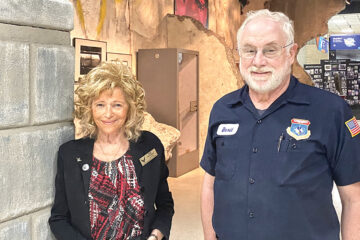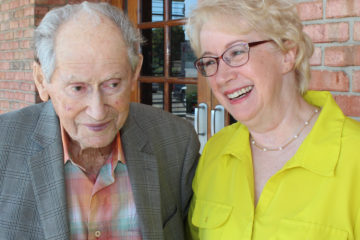They fought back
Dorothy Gordon recalls how she, her mother and sisters survived the Shoah in the forests of Belarus with the partisans
By Marshall Weiss, The Dayton Jewish Observer
“Let me tell you something. Everybody has the same story. Only in a different way,” Dorothy Gordon, age 90, says of those who survived the Holocaust.
Dorothy’s story began when she was 16 in 1940. The Germans knocked on her family’s door in the Belorussian village of Postavy — “Open up, Jude!”
“They took us all down into a basement and they kept the women there, my grandpa, my grandma, my aunt, my uncle, three children and us: my father, my mother, and me and two sisters.”
After two and a half days in the basement, a soldier took them to an office and asked why they were shooting at the Nazis when they took over the town.
“And that was a lie,” Dorothy recalls. “So they let the women go, only they kept two women, a pharmacist and a midwife. And I remember the midwife, she asked my father, ‘when they fire the shot, does it hurt?’ And my father said, ‘It takes a split of a second. It doesn’t hurt.’
The Nazis then shot all the men. Dorothy and the freed women were sent with the rest of the town’s Jews to a ghetto.

“When we went to the ghetto, it was my mother and three daughters and a son,” Dorothy says. Her brother had slept outside in the barn the night the men of her family were rounded up to be shot.
In that ghetto was a group that worked with the partisans, a resistance force of native Poles and Russians.
A cousin of Dorothy with the partisans snuck into the ghetto to rescue family and bring them to the forest. Dorothy was among 18 who escaped. But she would return.
“He told us where we will meet,” she says, “and we did not meet at the same place where he told us. And it had gotten to be light. The day broke already and we couldn’t find him and we didn’t know the way to get to the forest.
“By daytime, the gentiles started to have their cows and their horses on the outside in the forest. They lived around the forest. It was on a Sunday, the gentiles went to church.”
No one wanted to go back to the ghetto. Dorothy decided to return, out of concern for her mother, there by herself.
“I tore my petticoat and I put it on as a kerchief and took off my shoes and went back to the ghetto,” she says.
When Dorothy returned, four more families were living with them. No one believed she had escaped the ghetto and returned safely. The Nazis had told the Jews they killed all who had fled, “that they were going to have our heads carried on sticks, for the ghetto to see not to run away.”
A few weeks later, Dorothy’s cousin returned to the ghetto. This time, Dorothy, her two sisters and their mother went to the forest. Her cousin guided them.
They stayed in the forest three and a half years.
“And I joined the resistance,” Dorothy says. “We didn’t have a Jewish brigade. The other part of the forest had. If you could join the partisans, it was easier.”
She was a member of The Narocz Brigade, named for the nearby Narocz River.
“The partisans needed somebody to cook, to wash. Whatever they told us, we did. Sometimes it was to stand guard at night. Sometimes it was to be a nurse for the boys.”
The men would blow up trains on their way to the German front with ammunition.
“Everybody’s desire was to kill and kill and kill the Germans,” she says. We had to kill them because we needed clothes. And ammunition.”
Jewish men had to prove their worth, Dorothy adds. Not only were men required to bring guns and ammunition to be accepted in the partisans, they had to be able to shoot. And with the Poles and Russians, she says, antisemitism was inherent.
“They used to laugh at the Jews and say, ‘can’t you shoot, Jew?’ But they showed themselves they were heroes.”
Her mother and two sisters weren’t members of the partisans but lived close to the camp.
“There were little children and women and men, older men, older women that did not go to the partisans,” she says. “They couldn’t take them. And they lived on their own. So almost every single night they used to go begging. There were more Jews in the forests than people that lived in the villages.”
Until more Jewish partisans joined the brigade, Dorothy, her mother, and a sister would beg for food at villages around the forest.
“It’s cold. It’s snow. You come into a little village where you see the fire is burning in the house and potatoes were baking. They were very poor people themselves. They were plain, poor farmers.
“We’d knock at the windows when they were asleep, the gentiles, and beg for a piece of bread, a potato. And we befriended them. By befriending I mean she would leave you an extra potato on the windowsill in the wintertime.”
Those in the woods, she says, lived in constant fear.
“If you saw a German or a gentile who lived by the forest, sometimes they would bring the Germans to the forest. Of course the Germans came to the forest. They shot a lot of people. It was very hard. Very emotional. When they came, we used to run. You didn’t know which direction to run, but you ran. If you were lucky, you survived.”
When more Jewish partisans joined the brigade, they helped Dorothy and her family.
“For a while, we lived in open space,” she says. “We cut down trees and threw them on the fire. That’s how we lived for a whole year. Shelter we built from trees. Whoever had help, whoever had men, would build what was called a zimlanke, it meant underground, a hole. The drive to survive was stronger than the knowledge (of how) to live there. That’s how we survived.”
When Nazis came to the forest and the partisans fled, Dorothy says, the Nazis would hide bombs in the zimlankes.
“A lot of people lost their limbs because they thought maybe it’s clean.”
In the forest, Dorothy met her future husband, Harry Gordon.
“He was on a black horse,” she recalls. “I loved him the minute I saw him. And he had stories to tell of his own. How he left the ghetto. We were not from the same town, not far from each other, but we didn’t know each other.”
Harry had come from the Polish town of Glenoke.
Before the Nazis forced the Jews of Glenoke into a ghetto in 1941, Harry’s father, Elia, asked a gentile farmer to hide a Torah. After the war, the farmer returned the Torah to Elia.
In 1944, when the Russians liberated that part of Poland, the Narocz Brigade partisans left the forest. Dorothy came out of the forest with her mother, two sisters, and Harry.
They walked miles to find her family’s home. Another family now lived there.
“We came to our house and the lady won’t let me in. And a neighbor of mine, we knew them from before the war, I knocked at the door and when she saw me I thought she was going to faint. Because after the war, to see a Jew was a little scary for them. Because why? Because they were very mean to us. We slept on the floor, a few of us from the same town.”
Harry and Dorothy married that year. By way of a DP camp in Germany, they immigrated to the United States, first to an aunt in Brooklyn.
In 1951, they moved to Dayton, where Harry’s sister lived. Here they raised three children and became active members of Beth Jacob Congregation, now home to the Torah scroll Elia Gordon rescued from Glenoke.
“What fascinates me personally is, a lot of Jews brought Torahs back home,” Dorothy says, “but how a gentile risked his life to hide the Torah when the Germans were there. And they took houses apart to look for religious things. And a Torah? A Torah is not a pin, you cannot hide it. And there were gentiles that did it, that hid Jewish children. I was in the partisans with women, older women that had children already, and gentiles were hiding their children.”
But their first years in Dayton, Dorothy says, were painful.
“The newcomers that came to Dayton had a very hard time to be recognized as people,” she says. “Nobody looked at us. Nobody cared for us. And then slowly, people got to see us as human beings.
“When we wanted to start a club of our own — to meet, we didn’t know English, to learn from each other — and we asked for the American people to come and hear what we had to say, how bad it was, and to accept our children even if they don’t know the English language, even if they are not dressed like your children are, give us time to Americanize a little. And we decided to invite the American people to our gatherings. At first we started it on our own. Nobody came.”
Dorothy and Harry lived in Dayton until Harry died in 1994. Dorothy then moved to Pembroke Pines, Fla. This year, she moved to Columbus, where her daughter lives.
“How did I do it? How did I stay in the basement with my Dad and they killed him and not me? Why did I deserve it? How come I deserve to be alive and my girlfriends or whoever was dear to my heart is not here? It hurts when I came back home from the forest and not to find anybody. Not a soul. It hurts. And I live in it constantly. The older I get the more I miss them.”
To read the complete September 2014 Dayton Jewish Observer, click here.





